
Customer’s Entitlement Backfires When Car Dealership Cancels The Deal Last-Minute And Sells The Vehicle To Someone Else
Have you ever waited in a line at the store, saw a customer opening their mouth to say something to the cashier, and just knew that it would not go down well?
Like you could just tell that they would ask for something or complain, start a scene, and then you’d have to wait a million years until you could finally get served.
Although not a cashier, but rather a car dealership’s salesperson, a user in r/pettyrevenge shared their story about a customer who would have it his way or the highway (spoiler: it was the highway).
More info: Reddit
Buying a car may be difficult business, especially if you’ve got loads of crazy demands
Image credits: Osajus Photography (not the actual photo)
By the way, MSRP means “manufacturer’s suggested retail price”, TTL means “tax, title, and license” fees paid when buying a car, PITA means “pain in the [butt]”, CSR means “customer service representative” and GM means “general manager”.
A poster shared his story from working in a car dealership and encountering a super entitled customer wanting to buy a desirable truck
Image credits: ImbambiB**ch
Image credits: Andrew Bone (not the actual photo)
The truck was being sold for a very reasonable price already, but the customer Tom just wouldn’t stop haggling
Image credits: ImbambiB**ch
Tom would lie and be a general nuisance, pestering everyone who he thought could help him
Image credits: ImbambiB**ch
Image credits: goelshivi (not the actual photo)
Fed up with this, the poster and their manager simply sold the truck to a much nicer customer, giving Tom a full refund
Image credits: ImbambiB**ch
Tom got inflamed, threatening legal action, but was promptly shut down and told to contact the legal office of the dealership
The poster was working in a car dealership, selling Ford F-150 Raptor trucks when they were very desirable. They would already sell them without a huge margin, as other stores would ask up to 30k extra from their price.
A customer came in one day, named Tom in this story, wanting to buy the truck. The only problem was that he would cause scenes, lie, and make unreasonable demands in general.
He would contact just about anyone and everyone who he thought would listen to him, from customer service reps to the dealership’s HQ.
Everyone eventually got fed up with him and when the chance came, handed over Tom’s truck to another customer, giving him a full refund under the guise of “sorry, but we could never meet your expectations and don’t want to disappoint you.”
Tom made such a scene about this that he was even referred to the company’s lawyers – a thing that had only happened a couple of times in the poster’s career.
Customer service is a tricky thing. I mean, you can’t please people like Tom in OP’s story, unless you bend over backwards and complete every single one of the customer’s requests. But complaints from customers about being served poorly have been on the rise for a long time now.
Zendesk even says that it only takes one bad customer experience for them to switch to another company. And according to Salesforce, 62% of customers will share their bad experiences with others, further staving off others from shopping there.
Despite this, in 2022, customer service complaints had hit a record high, costing British businesses billions of dollars. Struggling with supply and staffing issues, more customers have been experiencing issues than ever, since 2008, according to the British Institute of Customer Service.
Image credits: Antoni Shkraba (not the actual photo)
There are many different types of customer protection mechanisms. Consumer protection covers a lot of different areas, such as product liability, privacy rights, unfair business practices, fraud, misrepresentation and other things related to consumer business interactions.
One contentious topic related to customer protection is privacy policy and terms of service documents. It’s probable that pretty much no one reads them, besides the people who compile them and legal practitioners, and I feel sorry for both.
According to Linklaters, while 74 million people had visited Channel 4’s website in a year, only about 1 in 2500 bothered looking at their privacy policy. Other websites had similar or even worse statistics.
The thing is that these privacy policies have been used to undermine privacy, more than once. Because of the length and business or legalese language used in the policy, it’s nearly impossible to actually take all of it in. This allows clever policy makers to then use the data given to them in ways people wouldn’t actually agree to – but that doesn’t matter, as they have already “consented”.
To better protect customers, at least in the EU, the General Data Protection Regulation (GDPR) was created. Essentially, it gave EU citizens better control over their data, with opt-in agreements to their data being used, meaning that websites now have to allow you to choose if you want your data to be used, rather than give your consent automatically.
It has also imposed severe sanctions on data controllers violating GDPR. They may face fines of upwards of $20 million or 4% of their global annual turnover. Many countries have gone on to model their own data protection laws based on the GDPR. In the US, the California Consumer Privacy Act protects Californians’ data, but is very similar to the aforementioned GDPR.
If you’re unsure what happens to your data, it’s suggested that you read about the legislation in your country and find out how to best protect your data.
The post popped off in the petty revenge community. It got more than 5k comments and upwards of 200 comments. Commenters basked in the satisfaction of the story, saying how good it has to be getting rid of a bad customer. Others shared stories of their own, saying how they managed to fire annoying, rude, and entitled customers.
Comments laughed about the whole situation, poking fun at Tom and sharing stories of their own
172Kviews
Share on FacebookI love everything about this. Working with the vehicle industry is part of my job so... OP, you're an absolute legend. Tom, you're a complete a*****e.
Same! I’m in dealership marketing now but I used to be a salesperson, I LIVE for dealership petty revenge stories haha
Load More Replies...I worked at a Toyota dealership when the Prius first came out, and dealers were selling them for well over MSRP. Similar to this story, if a customer became a problem it was easier to cancel the deal since there were tons of other customers that wanted the car and would pay the asking price.
I 100 percent believe this story. Why? Because the minute Tom said layer, he was immediately referred to the company lawyer. Great story!
I love everything about this. Working with the vehicle industry is part of my job so... OP, you're an absolute legend. Tom, you're a complete a*****e.
Same! I’m in dealership marketing now but I used to be a salesperson, I LIVE for dealership petty revenge stories haha
Load More Replies...I worked at a Toyota dealership when the Prius first came out, and dealers were selling them for well over MSRP. Similar to this story, if a customer became a problem it was easier to cancel the deal since there were tons of other customers that wanted the car and would pay the asking price.
I 100 percent believe this story. Why? Because the minute Tom said layer, he was immediately referred to the company lawyer. Great story!

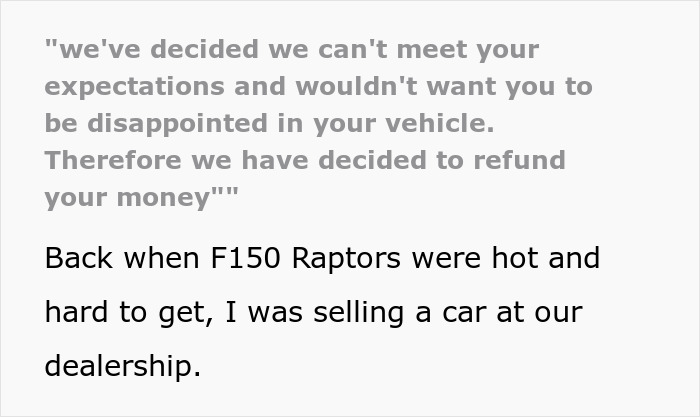
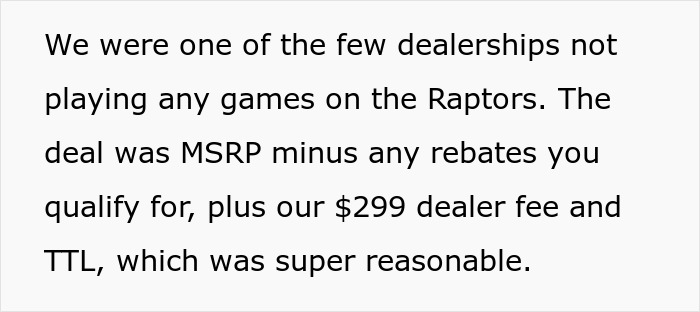


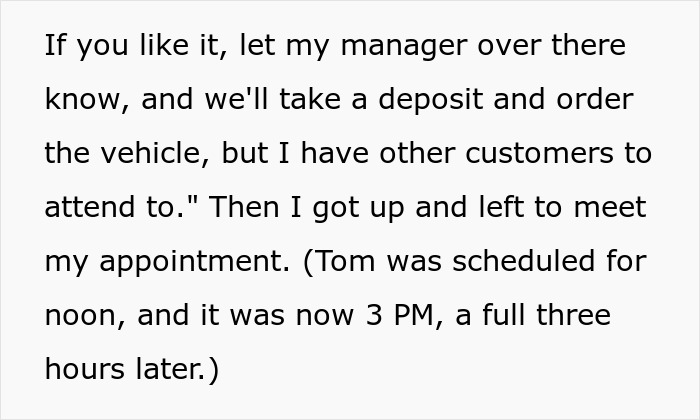

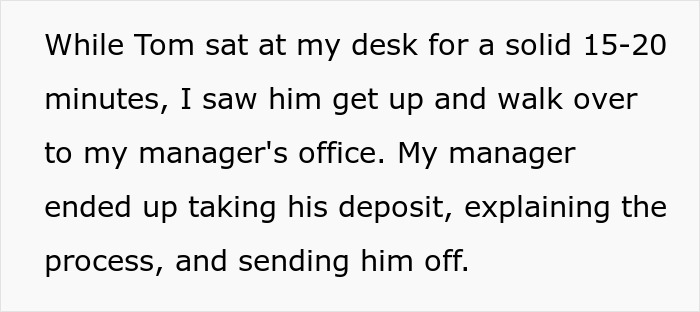
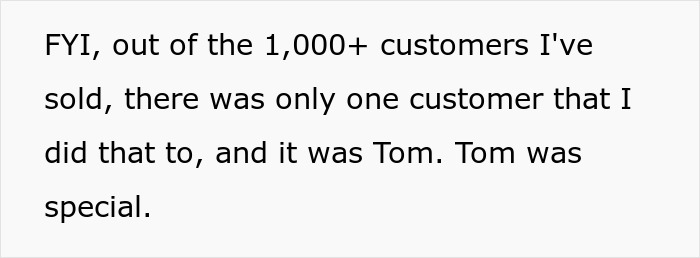

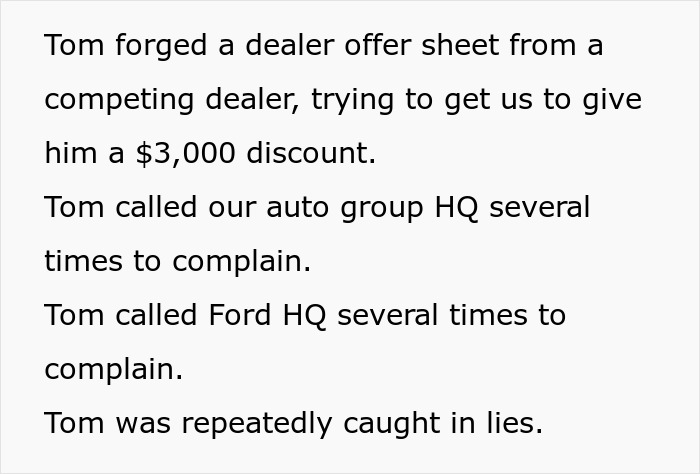

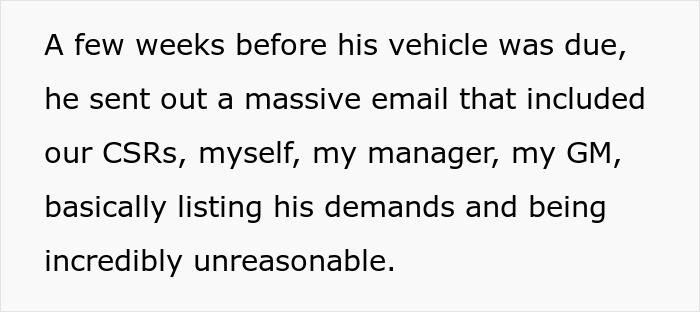
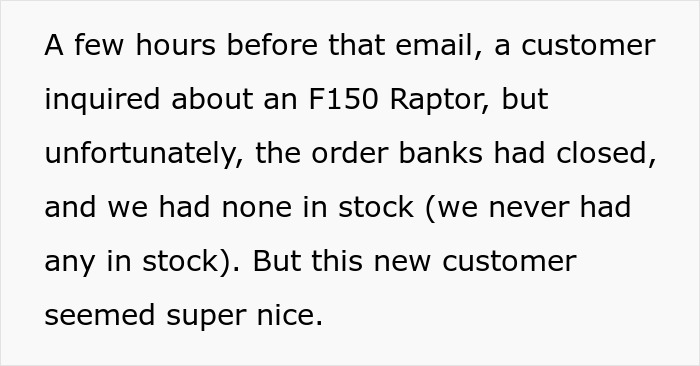
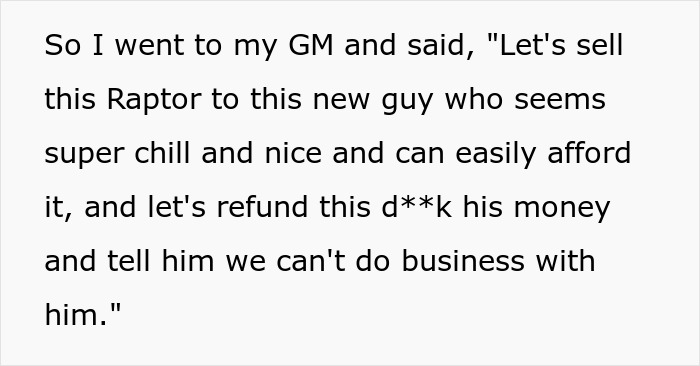






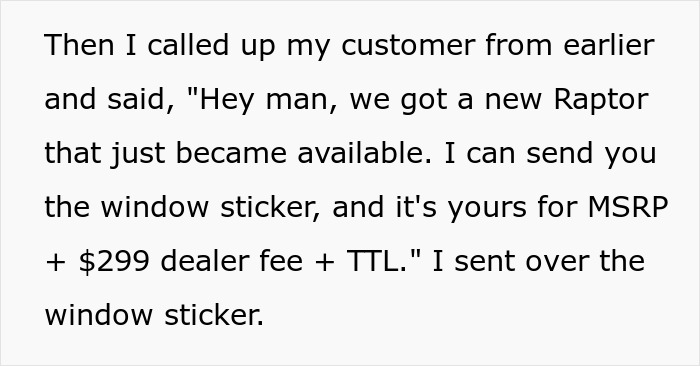
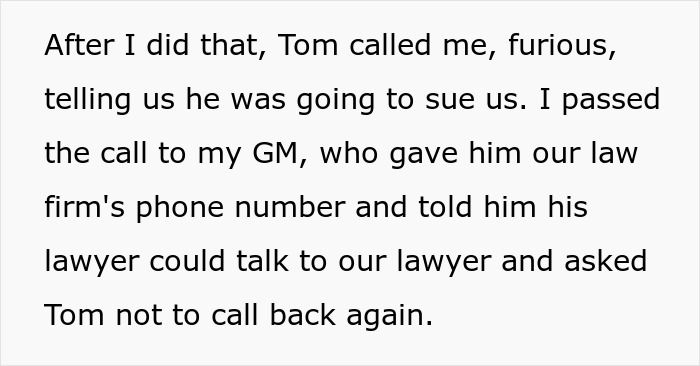
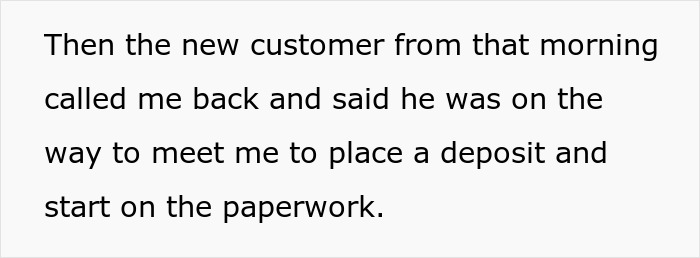














72
11